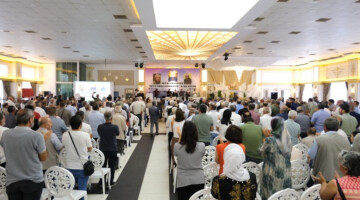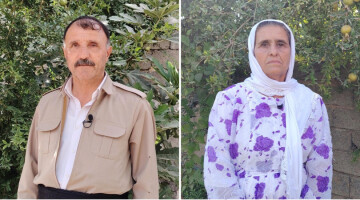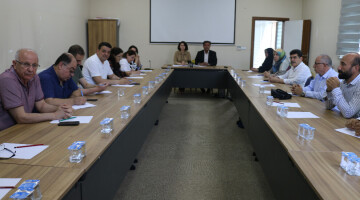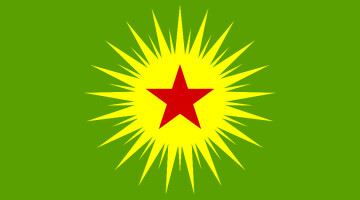The pro-government Yeni Şafak newspaper has published a top secret intelligence document revealing that Mustafa Kemal (Atatürk) met Dersim leader Seyit Riza the night before he was executed, telling Riza he would be spared if he ‘begged pardon’. Seyit Riza refused and was hanged along with 6 of his colleagues early the following morning. The document proves that the death sentences were decided on beforehand and that the gallows were prepared. The document refers to Mustafa Kemal telling Seyit Riza the people of Dersim are "Turks from Khorasan”. The document also reveals that the bodies of Seyit Riza and his friends were burnt after being exhibited in public.
The pro-government Yeni Şafak newspaper has published documents today that reveal that the execution of Seyit Riza and 6 others after the massacres in Dersim was carried out with the full knowledge of Mustafa Kemal. The newspaper has previously published documents claiming: "Atatürk was poisoned by [Prime Minister] Ismet Inönü”.
The document claims Seyit Riza was taken to see Mustafa Kemal the night before he was executed, and that he refused to beg pardon.
The top secret document contains the following:
Order for the executions to be carried out by the weekend
To the Head of National Intelligence:
-Confidential-
A meeting was held with İhsan Sabri. He told us the court would issue a judgment and that the executions needed to take place by the weekend. But the most important point is that Seyit Riza and our President must meet and that this take place in the highest secrecy and that all necessary measures must be taken to ensure this is the case.
Gallows set up prior to verdict
We made our preparations with the utmost rapidity and set out in the most vigilant manner. After several meetings the death sentences were signed and tractors and other vehicles were brought in to set up the gallows and to light up the Buğday Square where the executions were to take place. Preparations were made and reviewed several times in order for the meeting to take place and remain secret.
As the court hearing continued Seyit Riza was taken from the court
At 12.20 on the morning of 15 November Seyit Riza and his accomplices were brought to court. The bench began to read out the verdict. 14 people were acquitted and seven accused, including Seyit Riza, were sentenced to death. As the word ‘idam’ [capital punishment] was not used, there were voices heard in the court saying in Kurdish ‘no death penalties’. As the hearing ended Seyit Riza was taken to a jeep with the police chief and İhsan Sabri. There were 5 vehicles and when we reached the Elazığ Central Railway station, which had been closed in readiness and the staff had been sent home. There was no one at the station except for MAH (national intelligence) operatives.
Seyit Riza refused to sit down
The President’s white carriage was in a siding. After waiting for 8 to 10 minutes we boarded the train. Alongside the President were Alpdoğan Pasha, Kazım Orbay and the President’s aide-de-camp. A meal was in progress and alcohol was being consumed. The President looked at Seyit Riza and told him to take a seat. Seyit Riza refused to sit down. The President reminded him that the court had handed down a death sentence, which would be carried out that very night, and told him that if he expressed remorse and begged forgiveness he would pardon him. Seyit Riza said he had not done anything that warranted remorse, that all they had done was protect their own lives, property and land. He added that the President had only listened to state officials, and that he wanted to explain the realities.
There is no rebellion, only repression
The President nodded and Seyit Riza explained calmly how Dersim had suffered great repression in Ottoman times, but despite this they had protected Dersim, and ot sent men to the Ottoman army, but had sent many men to join the national struggle, that they trusted the Republic, and that their trust had increased in particular after the abolishing of the caliphate. He added that they had assisted in in collection of arms, that most of them had been handed in, that if they had intended to revolt they would not have surrendered their weapons, and that truly Dersim had not wanted to rebel against the Republic.
When he explained the persecution Alpdoğan tried to intervene
Seyit Riza said the gendarme had constantly incited the people to rise up, encouraged hostility between the tribes and invented pretexts to attack the people. He said many people had been killed by bombs dropped from aircraft, and that there had been massacres of women and children who had taken refuge in caves. Alpdoğan Pasha tried to interrupt, but the President signalled him to remain silent and requested Seyit Riza to continue.
Seyit Riza said he had been tricked
(Seyit Riza explained how promises had been made before he surrendered) "An officer from the General Staff came to see me. He said you were waiting at the Erzincan Governate to discuss peace. He swore it was true and I believed him. I went with three companions to Erzincan and they arrested us and sent us to Elazığ prison. They tricked us again after the trial started. They altered my son’s age and made him 2 years older [in order for a death sentence to be passed]. On your orders they handed down death sentences. Although I trusted promises made and surrendered you are going to execute me. How can I trust you again?”
'You’re Turks' said Mustafa Kemal
The President said he would have an investigation carried out as he had not heard about them before, adding: "Ask forgiveness from me, express remorse so that I may pardon you. If you do this you will be more useful to Dersim. You will cooperate with us. The Republic will do very worthwhile things for Dersim. The people of Dersim came from Khorasan, they are Oğuz Turks. When they become reacquainted with their Turkishness they will do very useful things for the Republic. I believe this, don’t miss this opportunity.”
I do not want a pardon
Seyit Rıza replied: “I did a lot for peace, for the republic. I helped collect the weapons. Certain people were wanted, I turned them in. Every time they said: ’this is the last thing.’ Then they began to ask for more things. At first I didn’t understand, then when the Tunceli Law was enacted I realised that it didn’t matter what we did, as your plan was to eradicate Dersim, to wipe it off the map. I eventually understood this. I do not regret anything I did. I do not want a pardon. These are my final words. I will say no more.”
Mustafa Kemal gave an order
The President was annoyed and stood up. He pointed to Seyit Riza, saying: 'take him away and do what is required'. As Seyit Riza was being taken outside he turned to the President and said: "I didn’t understand your deceptions, I couldn’t cope with them, that’s why I wanted to speak to you. I’m going to die, but I did not submit and may this cause you trouble.” The President gestured for us to take him away and we left the compartment. We went to the Buğday Square.
They exhibited the bodies
It was Seyit Riza’s turn to go to the gallows. He pushed away the Gypsy boy and stood on the stool. The he said in a strong, deep voice: "We are the descendants of Karbala. It is shameful, it is tyranny it is murder.” The he put the noose around his neck and kicked away the stool. The courage of this elderly man amazed everyone. The bodies were left hanging for the whole of Monday 15 November and on 16 November were driven around Elazığ to show the people.
‘The bodies were burnt’
İhsan Sabri summoned us to a meeting at the governor’s office at 12.00. He said: "The hurried execution of Seyit Riza will definitely lead to concern and anxiety. The order from Ankara is that we are to say that it was imperative that we execute Seyit Riza before the President arrives in Elazığ as there was a possibility he might pardon him. Also, the bodies will be burnt and buried at a secret location. This task will be carried out by colleagues in MAH.” The corpses were then taken to waste ground and burnt using kerosene. The remains were then put in sacks and buried in a pit between the Elazığ Central station and the Yolçatı station. A map of the site, records of what was said on the train and a recording were handed to İhsan Sabri. Two copies of this report were prepared, with one being submitted to the Prime Minister’s office and one to İhsan Sabri Bey.













